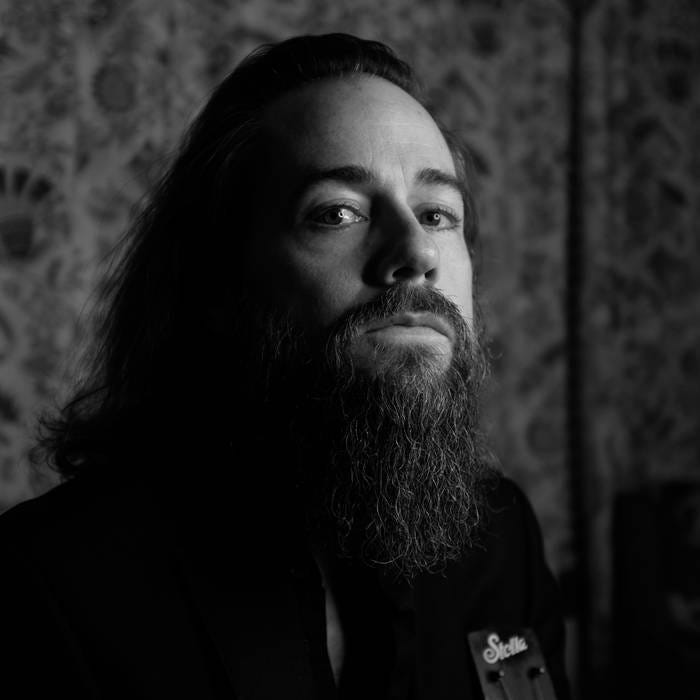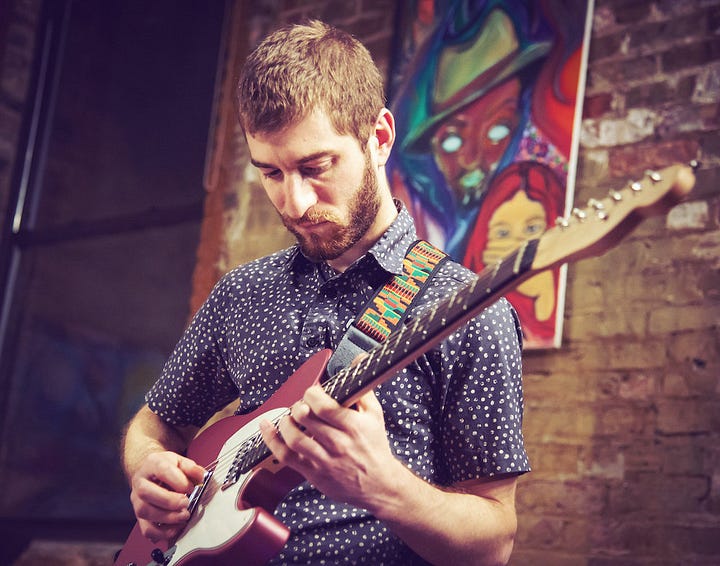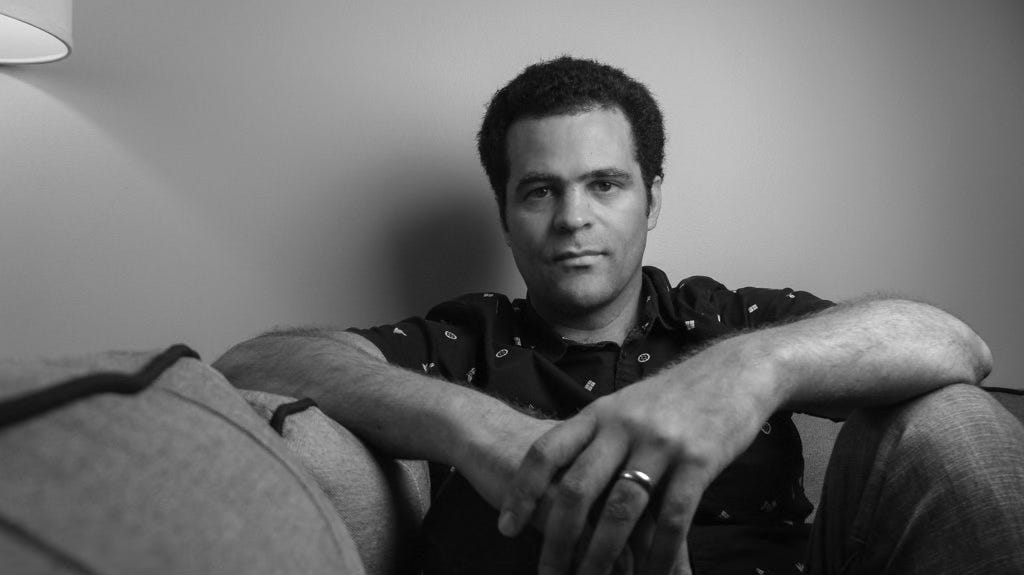Recordings discussed in this post and the next:
Stomping Off From Greenwood (2019) Greg Ward, recorded 2017, featuring Greg Ward, alto saxophone; Matt Gold, guitar; Dave Miller, guitar; Matt Ulery, bass; Quin Kirchner, drums
Waterwheel, (2021) Daniel Thatcher, featuring Daniel Thatcher, bass; John Kregor, guitar; Matt Gold, guitar; Devin Drobka, drums
OK I’ll admit it: sometimes when people ask me about my favorite pianists I hedge and say that I actually listen more to guitarists. Why? Well, for one thing, there’s a propensity for jazz pianists to overplay. The ten fingers, all those keys—it’s a lot of temptation! It’s a reason to focus on jazz organists who also play bass, or folks like Cole DeGenova, who is often seen playing ruthless left-hand Moog bass: the two distinct roles seem like a good discipline and good constraint on unbridled verbosity. But also I was drawn back into the modern jazz scene (excluding the Chicago scene) more by Kurt Rosenwinkel than by any pianist. His lyricism and his inventiveness as an accompanist and composer (working closely with Mark Turner) ignited my sense that jazz had been moving in a direction I wanted to follow.
The other problem is the instrument itself, or rather the endless headaches that accompany trying to get an ideal sound, all the money and effort involved. Where I’ve gotten to with this problem was in part determined when I was first playing gigs in college, on some truly terrible dorm pianos. I came to the conclusion that there were almost always creative options afforded by a physical piano, and it could be fun to discover these: right down to missing keys, or places where the piano was so out of tune with itself that it chorused madly, or played no definable tone at all. (My high school music teacher has been into John Cage, and I have memories of preparing a disused piano forgotten at the back of a school storage room—this doubtless was good training to play on terrible pianos too.)
And another important corroboration I received for this open, embracing view of “bad” or inferior pianos was from my friend Andrius Zlabys, who is the first concert pianist I have met (OK, I he’s really the only one I know) who was sanguine about ordinary pianos. It’s great to have a great piano, but it isn’t necessary, was his view. So anyway, this is where I try to live: if a venue has a piano—good! I try to make the best use of it I can. If it has a beautiful piano—so much the better, but I’m not going to be mad if the hand I’m dealt is a somewhat lesser instrument.
But, the whole thing is a level of complication that most other instrumentalists don’t have to think about, and I am sometimes jealous of that. And a new layer that has appeared for me since performing more frequently is the venue owner or sponsor who is eager for you to praise their piano. That can be tricky! I always feel grateful that any piano is there at all. On the other hand, at least half of my gigs involve no piano, and there I can control my electronic sound just as I’d like, and I do, and that’s really not so bad.
But all of this was by way of turning to guitar players. Chicago is blessed with a fine crop of them. I haven’t profiled any yet, and it’s time to start. And I’m doing it—somewhat to my surprise!—in ensembles that resist my vision of the guitar as austere, disciplining instrument, that focuses musical attention and prevents excessive flights of fancy and grandiloquence that seduce keyboard players. Hard to argue that when the band includes not one wildly resourceful and inventive guitarist, but two.


I’ll admit that I have been slightly skeptical of this enterprise, especially when I am as deeply impressed as I am with these three players: Dave Miller, Matt Gold, and John Kregor. Any one of them on a gig would make me be excited to be there. But it isn’t obvious to me that having two of them is a big advantage, and I worry that their individuality could be diluted or blurred by appearing together.
It isn’t that I haven’t listened to double-guitar records with great pleasure: I have. I am a particular fan of I Can See Your House From Here (1994), a session where John Scofield and Pat Metheny joined forces, assisted by Steve Swallow on bass and Bill Stewart on drums. Part of what made that work for me was the very distinct sounds and styles of the two guitarists (and they are also separated in the stereo field). So there was little sense of overlap, or danger of an unintentional merge.
What is quite interesting to me about these two bands, namely Greg Ward’s Rogue Parade and Daniel Thatcher’s Waterwheel, is that neither one seems to prioritize keeping a bright line between the players. On the contrary, they both, in very different ways, seem to want to exploit, at times, the capacity for merging the two instruments into a sort of super-guitar. One of the things I like about guitarists on their own is that they often split their accompaniment and soloing: a phrase of a solo, then a chord or two, then more phrases, then another chord, and so on. (Though lately I have been noticing various spots where Kurt Rosenwinkel himself overdubs an accompanying part to avoid just that feel!) But obviously with two guitarists, we can have chords playing with the frequency of a pianist, because one guitar is freed up when the other is soloing. So again, more like a pianist with two hands and ten fingers.
Greg Ward’s Rogue Parade has released two albums: Stomping Off From Greenwood (2019) and Dion’s Quest (2023). Both feature Matt Ulery on bass, Quin Kirchner on drums, and Dave Miller as well as Matt Gold on guitars. On the second record, Miller also plays synthesizers, and everyone contributes vocals. For now, I’m going to focus mostly on the first recording.
What’s instantly noticeable about the first track on the first record, “Metropolis,” is the way the bass and drums are recorded. Both are given a measure of compression, a move that to me says, they aren’t attempting to reproduce the sounds of acoustic instruments with minimum interference. Where we’re headed makes sense of this: the drum part here becomes a blistering wash of sound, occupying sonic space in a way reminiscent of metal or punk. And to cut through that, the bass is given corresponding treatment.
Now with your forgiveness I’ll get a little technical: the piece presents layers of patterns built on two bars of 5/4. Matt Gold plays a pattern of displaced pairs of sixteenth-notes that resolves every two bars. Then Dave Miller comes in with a chord pattern in double-dotted half-notes, which in 5/4 is symmetrical and opens up the option of a half-time feel (which the band eventually takes). Then he joins Ward in playing a melody built on half notes—which isn’t symmetrical but gets resolved every two bars.
OK, non-musician types, I realize that was probably gibberish. But I might take a chance at diagramming this whole thing: the effect is of superimposed, connected motions, from the frenetic to the soaringly lyrical—which is where Ward ends up in his improvisations. So a cityscape—something like a Varèse Amériques for prog/post-rock group of superbly accomplished creative musicians. But the feeling is deeply optimistic, delight in the energy and complexity and togetherness, and delight in feeling at home there. If you know Greg Ward, this all feels a lot like the Ward we know: an unstoppable force for good things on the scene.
The next post will continue to Daniel Thatcher’s Waterwheel.
Heads up readers that I’m playing a variety of interesting gigs around the Midwest in the coming months. Details on the various bands and configurations are on my website.
March 29, The Plus, Eau Claire
April 3, Berlin, Minneapolis
April 19, Jazz Crawl, Eau Claire
April 28, Green Mill Chicago Composers Collective, Chicago
May 10, the Lakely, Eau Claire
May 22, Lucille, Madison
May 28, The Whistler, Chicago




